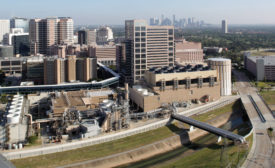Home » district energy
Articles Tagged with ''district energy''
Project Files: Episode 63 — University of Cincinnati Chiller Upgrade
Smardt chiller install achieves 32% reduction of kWhr in energy needs
Read More
District Heating and Cooling Market: Big Players Likely to Up Competition
Big plant operators and private operators are predicted to start manufacturing DHC systems
December 20, 2016
Agreement to Enhance International Collaboration on District Heating and Cooling, CHP
IDEA joins four organizations in global effort to increase deployment of district energy/CHP
September 18, 2015
Detroit Renewable Energy Honored by International District Energy Association
Recognized for largest expansion of district energy infrastructure in North America
September 1, 2015
Award-winning CHP System Serves Texas Medical Center
Project proves cost-effectiveness, reliability of large-scale cogeneration
Read More
Latest Trends in District Energy, CHP, and Microgrids Explored at IDEA2015
Event features more than 100 speakers and over 950 attendees from 21 countries
July 16, 2015
Hurst Boiler Selected for Biomass District Energy Project
Sullivan County, N.H., Sees Immediate Economic and Environmental Benefits
December 29, 2014
Copyright ©2024. All Rights Reserved BNP Media.
Design, CMS, Hosting & Web Development :: ePublishing







